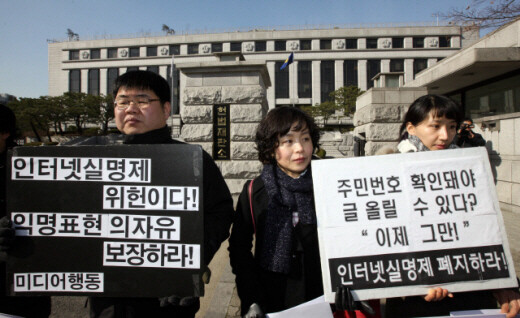hankyoreh
Links to other country sites 다른 나라 사이트 링크
YouTube Korea now exempt from real name system

The government has decided not to apply its Internet “real name system” to YouTube, the world’s largest video-sharing Web site. On April 1, the Korea Communications Commission (KCC) excluded YouTube Korea from its list of new 167 Web sites to which the system would be applied this year.
With Google Korea’s YouTube Korea to be excluded from the system this year, Google Korea could withdraw the policy it put into place in April of last year blocking South Korean users from leaving comments or uploading videos.
KCC network ethics team chief Cho Hae-geun said Tuesday that since YouTube will no longer be subject to the real name system starting in April, users may leave comments or upload videos without incurring fines. Cho explained that while YouTube Korea’s website (kr.youtube.com) was previously subject to the real name system, this site no longer exists, and even locally, users access YouTube through youtube.com, which is not subject to the real name system. The KCC also said that to apply local laws to online services, they need to be registered as domestic businesses, but in the case of YouTube, a subsidiary of Google, it would be difficult to apply those laws because it is only a part of the international company Google Korea, but has no separate local legal entity. In accordance with these standards, the KCC also decided not to classify uploading content and posting comments on YouTube by South Korean iPhone users as infractions of the real name system.
However, the KCC’s decision to exclude YouTube Korea from the real name system based on its status as an overseas Internet domain is being criticized as poor logic that adversely discriminates against locally registered Web sites. YouTube Korea, which was subject to the real name system starting last year, was not a separate site, but simply a function that immediately connected users to youtube.com by connecting to kr.youtube.com. Even if one connects via a separate website, since users are using one website, it is logical that the Web site would submit data that shows the real number of users that connect with it. When the KCC decides the sites that will be subject to the real name system, they do so after three Internet research firms have surveyed the average number of daily users of those sites over a three-month period. Even if one website has several addresses, it is considered one website, and based on this standard, Youtube is subject to the real name system both last year and this year.
YouTube Korea was subject to the real name system beginning last April as it surpassed 100 thousand visitors per day, but Google was able to avoid the law by blocking South Korean users from uploading videos and posting comments for a year. Google’s lack of cooperation on the real name system was widely reported in the world media, while South Korea’s Internet environment also became widely known. Through its blog, Google issued a statement at the time that the company prioritized freedom of speech in its services, and that in extreme circumstances, it would be impossible to provide benefits to users of specific countries while observing the law if the nation’s laws and lack of democratic procedures do not fall in line with Google’s principles.
Please direct questions or comments to [englishhani@hani.co.kr]
Editorial・opinion
![[Column] Season 2 of special prosecutor probe may be coming to Korea soon [Column] Season 2 of special prosecutor probe may be coming to Korea soon](https://flexible.img.hani.co.kr/flexible/normal/500/300/imgdb/original/2024/0426/3317141030699447.jpg) [Column] Season 2 of special prosecutor probe may be coming to Korea soon
[Column] Season 2 of special prosecutor probe may be coming to Korea soon![[Column] Park Geun-hye déjà vu in Yoon Suk-yeol [Column] Park Geun-hye déjà vu in Yoon Suk-yeol](https://flexible.img.hani.co.kr/flexible/normal/500/300/imgdb/original/2024/0424/651713945113788.jpg) [Column] Park Geun-hye déjà vu in Yoon Suk-yeol
[Column] Park Geun-hye déjà vu in Yoon Suk-yeol- [Editorial] New weight of N. Korea’s nuclear threats makes dialogue all the more urgent
- [Guest essay] The real reason Korea’s new right wants to dub Rhee a founding father
- [Column] ‘Choson’: Is it time we start referring to N. Korea in its own terms?
- [Editorial] Japan’s rewriting of history with Korea has gone too far
- [Column] The president’s questionable capacity for dialogue
- [Column] Are chaebol firms just pizza pies for families to divvy up as they please?
- [Column] Has Korea, too, crossed the Rubicon on China?
- [Correspondent’s column] In Japan’s alliance with US, echoes of its past alliances with UK
Most viewed articles
- 11 in 5 unwed Korean women want child-free life, study shows
- 2AI is catching up with humans at a ‘shocking’ rate
- 3[Editorial] Yoon cries wolf of political attacks amid criticism over Tokyo summit
- 4[Photo] “Comfort woman” survivor calls on president to fulfill promises
- 5“Japan’s No. 1 salesman”: Korean groups blast president’s treatment of forced laborers
- 6Yoon calls 60+ hour workweek “unreasonable,” orders revamp of policy
- 7[Editorial] Yoon’s white flag on historical disputes with Japan backfires immediately
- 8‘We must say no’: Seoul defense chief on Korean, USFK involvement in hypothetical Taiwan crisis
- 9[Special reportage- part I] Elderly prostitution at Jongmyo Park
- 10[Photo] More Sewol paintings by Hong Sung-dam